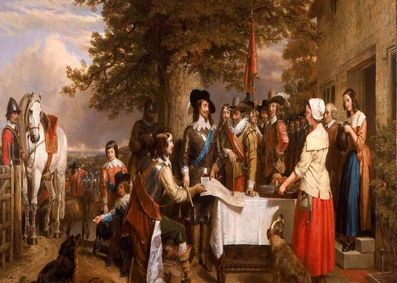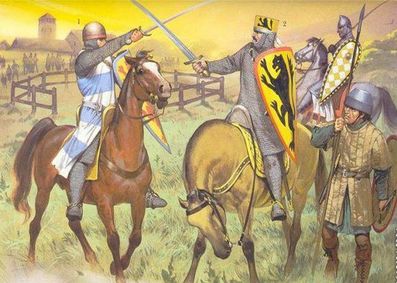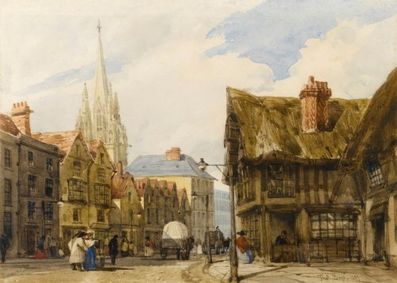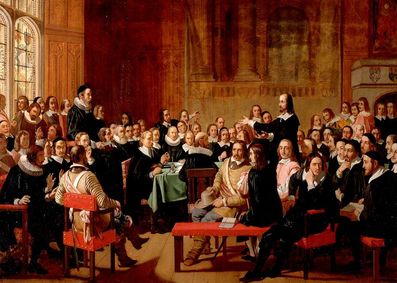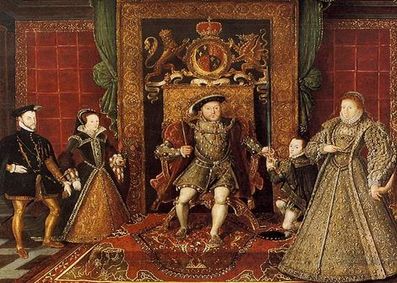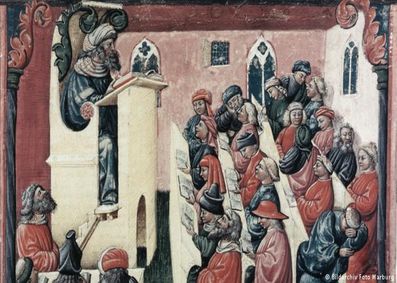- IN the beginning of the yeere, Charles the ninth King of France sent Ramboullet into England to the Queen with the ensignes of the Cockle-shelled Order of Saint Michael, that she might bestow them on two Noble men of England at her choise. She chose the Duke of Norfolke and the Earle of Leicester, Leicester as most deare unto her, Norfolke as most Noble. Whom Ramboullet solemnly invested in the Queenes Court at Westminster, after he had beene himselfe honorably placed for the King his master among the Knights of St. George at Windsore. Which French Order she then held for a great honour, remembering that no Englishman had beene chosen into that Order but her father King Henry the eighth, her brother King Edward the sixth, and Charled Brandon Duke of Suffolke. Which she, being most observant of all things which pertaine to honour, grieved to see afterwards growne vile and base, when she perceived it to be prostituted as it were to every man without difference. Neither did she onely regard matters of honour, but above all things most carefull she was of the safety and welfare of her subjects. For whereas, through the unseasonablenesse of the ayre, such as were skilfull feared a dearth of graine, she not onely prohibited the transportation of graine out of England, but providently also procured great plenty to be brought in.
- In the meane time Henry Earle of Arundell, the powerfullest Lord amongst the Nobility of the Land, after he had in a vaine hope of marriage with the Queene consumed great wealth, and his hope was quite dashed (Leicester being now in greatest power with the Queene, and his friends in Court sayling to his trust), obtained leave under colour of recovering his health, but indeed to mitigate his griefe, and voluntarily departed the Land. But others of the English Nation, who according to their innated fortitude, thought themselves borne to Armes, not to idlenesse, when Gentlemen out of all parts of Europe <which> were excited upon the fame of the warre against the Turkes, went into Hungary. Amongst whom, those of the better note were Sir John Smith cousan german to King Edward the sixth, being sonne to Jane Seimors sister, the Kings mother, Henry Champernoun, Philip Bushide, Richard Grenvill, William Gorges, Thomas Cotton, and others.
- In June following was the Queene of Scots, to the perpetuall felicity of Britaine, happily brought to bed of her sonne James, who lately was Monarch of Britaine; which she shortly after signified to Queene Elizabeth by James Melvin. The Queene, though shee inwardly grieved that she was prevented by her emulator of the honour of being a mother, yet sent she forthwith Sir Henry Killegrew to congratulate her delivery and the birth of her sonne, and to put her in minde no more to favour Shan O-Neal who then rebelled in Ireland, or to harbour Christopher Rokesbey, a fugitive out of England, and also to punish certaine Rank-riders upon the borders.
- Queene Elizabeth now making her Progresse into the Country to recreate her minde, that she might shew her selfe no lesse gracious to the Muses at Oxford then at Cambridge, which gently envyed one another, went to the University of Oxford, where, being magnificently intertained, she stayed seven dayes, being much delighted with the pleasantnesse of the place, the beautifulnesse of the Colleges, and the wits and most exquisite learning of the Students, who spent a great part of the night in Comedies and Tragedies, and the dayes in learned disputations, for which shee gave them large thankes in a Latin Oration with singular sweetnesse of speech, and so most graciously bade them farewell.
- As soone as she returned to London, the Estates of the Realme assembled themselves in great number the first of November, being the day appointed by summons; and after they had passed a bill or two, they began to dispute sharply about the succession, for that the Queen as it were vowed to virginity, did now in full 8 yeeres think nothing seriously of a husband, and on the one side the Papists propounded unto themselves the Queene of Scots, which had newly brought forth a sonne, and on the other wise the Protestants with different affections propounded to themselves, some one man, and some another, and every of them having respect to his owne security and Religion presaged the stormes of a most fearfull time, if she should dye without a certaine successor. And so farre brake forth their sharpe and hot spirits that they taxed the Queene, as if she neglected her Country and posterity, defamed Cecil with slaunders and scandalous books, as a corrupt Counsellour in this matter, and cursed Huic the Queenes Phisition, as a disswader of her marriage for I wot not what womanish impotency. The Earles also of Pembroke and Leicester and others openly, and the Duke of Norfolke more closely, thought that an husband was to be imposed upon the Queene, or a successor to bee publickly designed by an Act of Parliament, even against the Queenes will. Whereupon they were excluded out of the Presence Chamber, and prohibited accesse to the Queene. But they soone submitted themselves to the Queene, and obtained pardon.
- Yet they and the rest of the higher House, being carefull for a successor, besought the Queene with all earnestnesse by the mouth of Bacon Lord Keeper their Speaker, according to the duty which they owe to God, their Alleageance to their Prince, and love to their Country, that forasmuch as by her they now quietly enjoyed all the benefites of Peace, Justice, and Clemency, both they and their posterity might securely and alwayes enjoy the same by her. But (say they) they cannot enjoy the same, unlesse she marry, and withall designe a Successor. Above all things therefore they doe wish and pray her that she will joyne her selfe in the sacred bond of marriage to whomsoever, wheresoever, and how soone soever it may please her, to the end she may have children to bee Pillars of the Realme; and withall that she will with the Estates of the Realme constitute and appoint a Successor, if shee or her children (which God forbid) should dye without issue. That they should so earnestly begge this, which is so mainely necessary, there are (say they) many causes, to wit, the fresh feare which invaded all men, when very lately her health was indangered; the opportunity of the time, when the Estates of the Realme were now assembled, who would maturely deliberate of so weighty matters; the terror which she should strike into her adversaries; and the immortall joy wherewith shee should replenish all her subjects. They commend the example of her Ancestours, which in such cases have prudently provided for the security of their posterity, condemning that spech of Pyrrhus, who said hee would leave the Kingdome to him which had the sharpest sword. Moreover they propound how great a storme of calamities would hang over England if she should put off her mortality, designing no certain Successour; that seditions and Civill warres would breake forth, wherein the victory itselfe were most miserable; that Religion would be abolished, Justice smothered, the Lawes trodden under feet, when there would be no certaine Prince, which is the soule of the Lawe, and that the Kingdome would fall as a prey to forrainers. And other calamities of that sort they reckon up and exaggerate, wherein all men would be involved if she should dye without issue. Out of the sacred Scriptures also they modestly joyne hereunto precepts, counsels, and examples.
- But in the lower House, some there were which handled these things more tumultuously, namely, Bell and Monson great Lawyers, Dutton, Paul Wentworth, and others, which rent the authority of the Queenes Majesty too much, and amongst other things imputed that Kings are bound to designe a Successour, that the love of the subjects is the strongest, yea the impregnable Fort of Princes, and their onely prop and pillar. But this love Princes cannot get, unlesse they cause that it may goe well with their subjects, not onely while they live themselves, but after their deaths also. And this can by no meanes be effected, unlesse there be a Successor certainely knowne. That the Queene by not designing a Successor, doth both provoke the wrath of God and alienate the hearts of her people. But, that she may have God favorable to her, and her people most loving and fast tyed unto her, and that she may erect Statues for her selfe in mens mindes never to decay, let her designe a Successour. If not, she may be spoken of as a nurse, not as a mother of her Country, but as a step-mother, nay, as a parricide of her Country, which had rather that England which now breathed with her breath, should together with her expire, then survive her.That no Prince but cowards, and such as are hated of their owne people, and timorous women, have ever stood in feare of their Successours, and the dangers of a designed Successour are not to be feared of that Prance which is fortified with the love of his people.
- All this Queen Elizabeth heard with much discontentment, yet for a while she either contemned it, or concealed it within her brest. For she knew, being taught by experience, how great danger would threaten her by having a Successour designed, forasmuch as in the Raigne of Queen Mary many of the Nobility and people had cast their eyes and minds upon her, because she was to succeede her; whatsoever was said or done in the Queenes private Chamber, or Privy Councell, they presently revealed unto her; and Wyat and others, not content with their estate, and greedy of innovation, had conspired against Queene Mary, to place her in the Throne, when she full little thought of it. She knew that the hopes of competitours would be better kept in, and themselves contained in their duty, while shee held them every one in suspence and expectance, and proclaimed none. She knew that children, out of an over-hasty desire to raigne, had taken armes against their owne Parents; neither could there any greater kindnesse be expected from kinred. She had observed in reading, and discoursing now and then she called to remembrance, that successours in a collaterall line had seldome been proclaimed, that Lewis of Orleance, Successor to Charles the eighth, and Francis of Angolesme, Successour to Lewis in the Kingdome of France, were never declared, yet succeeded they without any stirre. That the designation also in England had ever beene the undoing of them that had been designed. For Roger Mortimer Earle of March, designed heire to the Crowne by King Richard the second, was in short time extinct; his sonne Edmund was for no other cause shut up in prison in Ireland full twenty yeeres, and there languished to death. John De-la-Poole Earle of Lincolne, designed Successour by Richard the third when his sonne was dead, was alwaies suspected by Henry the seventh, and in the end, attempting new matters, was slaine in the field; and his brother Edmund beheaded under Henry the eighth. But these things may seeme beside the purpose.
- But whereas there were some which ceased not with vehemency of minde and sharpe inforcement, daily more and more to urge and exclaime these things which I have said, and more biting speeches then these also, she caused thirty of the highest House, and as many of the Lower, to be picked out, and to come before her, whom with gentle reprehension she appeased, and with her Majesty, wherein was very much authority, diverted them from their purpose, promising largely not onely the care of a Prince, but also the affection of a mother. And whereas the Estates had offered farre greater subsidies then they were wont, upon condition that she would designe a certaine Successour, she flatly refused that extraordinary offer, accepted an ordinary summe, commending their affection, and freely remitted the fourth payment of the subsidy that was granted, saying that money in her subjects cofers was as well as in her owne.
- The last day of this Parliament shee made a short speech to the Estates to this effect, which I will more shortly abridge. Whereas Princes words doe enter more deepely into mens eares and mindes, take these things from our mouth. I that am a lover of the simple Truth, have ever thought you likewise to be ingenuous lovers of the same. But I have been deceived. For I have found that in this Parliament Dissimulation hath walked up and downe, masked under the vizard of Liberty and Succession. Of your number some there are which have thought that Liberty to dispute of the Succession, and to establish the same, is forthwith either to be granted or denyed. If we had granted it, these men had had their desire, and had triumphed over us. And if we had denyed it, they thought to have moved the hatred of our people against us, which our mortallest enemies could never yet doe. But their wisdome was unseasonable, and their counsels over-hasty, neither did they foresee the event. Yet hereby we have easily perceived who incline towards us, and who are adverse unto us. And wee see that your whole house may be devided into foure sorts. For some have been plotters and authours, some actors, which with smooth words have perswaded, some which have consented being seduced with smooth words, and some which have beene silent, admiring such boldnesse; and these certainely are the more excusable. Doe ye thinke that we neglect your safety and security by the Succession? Or that we have a will to infringe your Liberty? Be it farre from us. We never thought it. But indeed we thought good to call you backe when ye were running into the pit. Every thing hath his fit season. Ye may peradventure after us have a wiser Prince; but a more loving towards you, ye shall never have. For our part, whether we may see such a Parliament againe, wee know not. But for you, take heed, lest ye provoke your Princes patience. Neverthelesse, of this be assured, that we thinke very well of most of you, and doe imbrace every one of you with our former kindenesse, even from our heart.
- Thus by a womans wisdome she suppressed these commotions, which Time so qualified, shining ever cleerer and cleerer, that very few, but such as were seditious or timorous, were troubled with care about a Successour. And certainely the most sort of men, whatsoever they pretend, have no more feeling in publicke matters then concerneth their owne private. Neverthelesse, that the Successour might be the more certainely knowne, whom shee, according to the most undoubted right intended, she cast Thornton into the Tower, being at this time Reader of Law in Lincolnes Inne in London; of whom the Queene of Scots complained, that in his reading he had called her Title in question.
- In this Assembly of the Estates (besides other things for the benefit of the Common-wealth), a declaration was made by joynt consent of all men, That the election, consecration, confirmation, and investiture of the Archbishops and Bishops of England (which some had by way of calumniation called in question) were lawfull, and that the said Bishops were elected and consecrate rightely, and according to the Actes and Statutes of the Realme. And it was also enacted, That both they, and those which were from thenceforth in like manner to be consecrated, were and should be rightly and duly consecrate, any Law and Canon to the contrary whatsoever notwithstanding. For the Papists depraved them as false and counterfeite Bishops, peradventure for that the Unction, the Ring, the Crosier-staffe, with the Benediction were not used; and as if they were not ritely ordinated by three Bishops, which might by an ascending line referre their ordination to the Apostolike authority received from Christ. Which notwithstanding (as by the Registers appeareth), they might most truely have done, being consecrated with devout prayers, godly invocation of the holy Spirit, the imposition of three such Bishops hands, a Sermon preached, and the celebration of the Lords Supper.
- About this time was restrained by wholesome severity the insolents of certaine bad people, which here and there offered violence, beat, and openly in the streetes cryed out against those Informers whom the vulgar sort call Promoters. About the same time also approached the day appointed for the baptizaing of the Prince of Scotland; at whose Christening the Queene of England being requested to be Godmother, sent the Earle of Bedford with a Font of gold for a present, and commanded expressly that neither he, nor the Englishmen that were in his company, should give the Lord Darly the Title of King.
- The solemnity being finished, the Earle of Bedford, according to his instructions, dealt with the Queene of Scots, that the domesticall jarrings betwixt her and her husband might be compounded (for certaine ill-willers, sworne enemies to them both, had cunningly taken away that most sweet society of life and love betwixt them), and that the Treaty of Edenborough might be confirmed. This latter she flatly denyed, alleaging that there was somewhat in the Treaty which might be prejudiciall to her and her childrens Title to the Crowne of England. Yet shee promised to send Commissioners to England to treate of the confirming thereof, some things being altered, to wit, that she should abstaine from the Title and Armes of Englan, as long as Queene Elizabeth and those which should bee borne of her should live, as if it were conceived in the Treaty that she should abstaine from them altogether. Which Commissioners should also informe her how fouly shee was wrong’d through the bad practices of those that too much abused the ingenuous credulity of her husband. And now being sicke and weake, she commended by her Letters her young sonne to the trust and protection of Queene Elizabeth, wherein though shee knew (I use the very words of her Letter) that shee was undoubted heire of England after the Queene, and that many men forged much matter against her Title, she promised that she would no longer urge any declaration of her Title, but with all affection assist, and alwayes adhere unto her against all men.
- This yeere and the same day dyed two of the Privy Councell, John Mason Treasurer of the Queenes Chamber, a grave and learned man, a great intruder into Ecclesiasticall livings; and Sir Richard Sackvill Under-Treasurer of the Exchequer, a provident wise man, and the Queenes kinsman by his mother, which was a Bolen. In this Sackvils place was substituted Sir Walter Mildmay, an upright and most advised man; and in the roome of the other succeeded Sir Francis Knolles, who had married Catherine Cary, the Queenes cousin german by Mary Bolen.
Early Modern England
История Англии Раннего Нового времени
Данный сайт является научно-образовательным информационным проектом и предназначен для всех, кто проявляет интерес к исторической науке. В настоящее время образование в вузах Российской Федерации переживает трудные времена. При переходе со «специалитета» на «бакалавриат» происходит сокращение аудиторных занятий для студентов и общее увеличение годовой учебной нагрузки преподавателей. В таких непростых условиях данный проект призван помочь преподавателям, аспирантам и студентам исторических факультетов в изучении истории Англии раннего Нового времени.
ANNO DOMINI 1566
Популярные статьи
- Экономическое развитие Англии в XVI - середине XVII
- Культура Англии XVI-XVII
- Английские фермеры первой половины XVII (по материалам расходных книг и дневников)
- Экономическая политика Елизаветы Тюдор
- Основные направления финансовой политики Тюдоров (1485-1603)
- Преступления в тюдоровской Англии (по данным современника)
- Древние Королевские прерогативы и парламент в XVI-XVII вв. Столкновение интересов.
- Аграрное законодательство Елизаветы Тюдор и первых Стюартов
- Современники о пауперизме в Англии XVI
- Из истории английских йоменов (происхождение, эволюция, социальный статус)
Последние публикации
- Рецензия на монографию Кирюхина Д.В. Стратегия репрезентации королевской власти в культурной и интеллектуальной жизни английского двора в 1485-1533 гг.
- Роль Альманаха «Журнал только для девушек» в воспитании английских интеллектуалов конца XIX – начала XX века
- Культура питания Викторианской и Эдвардианской Англии в мире кролика Питера Беатрис Поттер
- Придворные художники династии Тюдоров в контексте становления культурно-интеллектуального сообщества
- Сладости «епископской трапезы» в эпистолярном и поэтическом наследии Эразма Роттердамского и Андреа Аммонио
- «Анналы Генриха VII» (1504–1505 гг., 1507–1508 гг.) Бернара Андре: история, пропаганда или мифотворчество?
- Легендарные правители древности в первой английской речной поэме “Κυκνειον άσμα” придворного поэта и антиквара Дж. Лиланда
- Роль цвета в визуализации образов власти в правление первых Тюдоров
- "Жестокое время Тюдоров" на страницах современного исторического романа
- Поиски методов повышения файнов в Англии первой трети XVII в. (на примере манора Лавенэм графства Саффолк)
